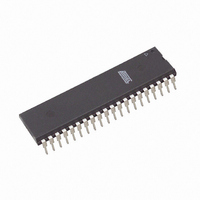AT89S51-24PC Atmel, AT89S51-24PC Datasheet - Page 4

AT89S51-24PC
Manufacturer Part Number
AT89S51-24PC
Description
IC 8051 MCU 4K FLASH 40-DIP
Manufacturer
Atmel
Series
89Sr
Datasheet
1.AT89S51-24JU.pdf
(31 pages)
Specifications of AT89S51-24PC
Core Processor
8051
Core Size
8-Bit
Speed
24MHz
Connectivity
UART/USART
Peripherals
WDT
Number Of I /o
32
Program Memory Size
4KB (4K x 8)
Program Memory Type
FLASH
Ram Size
128 x 8
Voltage - Supply (vcc/vdd)
4 V ~ 5.5 V
Oscillator Type
Internal
Operating Temperature
0°C ~ 70°C
Package / Case
40-DIP (0.600", 15.24mm)
Lead Free Status / RoHS Status
Contains lead / RoHS non-compliant
Eeprom Size
-
Data Converters
-
Available stocks
Company
Part Number
Manufacturer
Quantity
Price
Company:
Part Number:
AT89S51-24PC
Manufacturer:
ATMEL
Quantity:
3 354
Company:
Part Number:
AT89S51-24PC
Manufacturer:
AT10
Quantity:
65
Part Number:
AT89S51-24PC
Manufacturer:
ATMEL/爱特梅尔
Quantity:
20 000
4. Pin Description
4.1
4.2
4.3
4.4
4.5
4.6
4
VCC
GND
Port 0
Port 1
Port 2
Port 3
AT89S51
Supply voltage.
Ground.
Port 0 is an 8-bit open drain bi-directional I/O port. As an output port, each pin can sink eight TTL
inputs. When 1s are written to port 0 pins, the pins can be used as high-impedance inputs.
Port 0 can also be configured to be the multiplexed low-order address/data bus during accesses
to external program and data memory. In this mode, P0 has internal pull-ups.
Port 0 also receives the code bytes during Flash programming and outputs the code bytes dur-
ing program verification. External pull-ups are required during program verification.
Port 1 is an 8-bit bi-directional I/O port with internal pull-ups. The Port 1 output buffers can
sink/source four TTL inputs. When 1s are written to Port 1 pins, they are pulled high by the inter-
nal pull-ups and can be used as inputs. As inputs, Port 1 pins that are externally being pulled low
will source current (I
Port 1 also receives the low-order address bytes during Flash programming and verification.
Port 2 is an 8-bit bi-directional I/O port with internal pull-ups. The Port 2 output buffers can
sink/source four TTL inputs. When 1s are written to Port 2 pins, they are pulled high by the inter-
nal pull-ups and can be used as inputs. As inputs, Port 2 pins that are externally being pulled low
will source current (I
Port 2 emits the high-order address byte during fetches from external program memory and dur-
ing accesses to external data memory that use 16-bit addresses (MOVX @ DPTR). In this
application, Port 2 uses strong internal pull-ups when emitting 1s. During accesses to external
data memory that use 8-bit addresses (MOVX @ RI), Port 2 emits the contents of the P2 Special
Function Register.
Port 2 also receives the high-order address bits and some control signals during Flash program-
ming and verification.
Port 3 is an 8-bit bi-directional I/O port with internal pull-ups. The Port 3 output buffers can
sink/source four TTL inputs. When 1s are written to Port 3 pins, they are pulled high by the inter-
Port Pin
P1.5
P1.6
P1.7
IL
IL
) because of the internal pull-ups.
) because of the internal pull-ups.
Alternate Functions
MOSI (used for In-System Programming)
MISO (used for In-System Programming)
SCK (used for In-System Programming)
2487D–MICRO–6/08

















